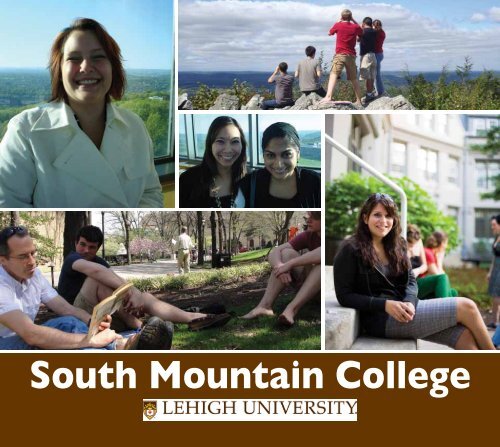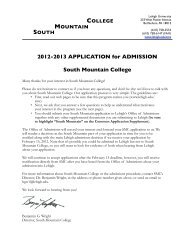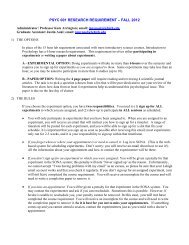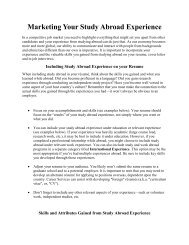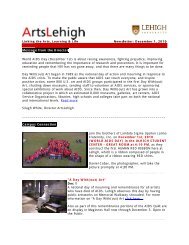South Mountain College - College of Arts and Sciences - Lehigh ...
South Mountain College - College of Arts and Sciences - Lehigh ...
South Mountain College - College of Arts and Sciences - Lehigh ...
- No tags were found...
Create successful ePaper yourself
Turn your PDF publications into a flip-book with our unique Google optimized e-Paper software.
<strong>South</strong> <strong>Mountain</strong> <strong>College</strong>
<strong>South</strong> <strong>Mountain</strong> <strong>College</strong>Take Charge <strong>of</strong> Your EducationTake RisksYou have many interests <strong>and</strong>you want an opportunity toblaze new trails. SMC is opento anyone who wants to play<strong>and</strong> who is willing to take therisk <strong>of</strong> entering new territory.Create yourown pathYou help choose the topicsto investigate <strong>and</strong> togetherwith faculty <strong>and</strong> students,you select the next readingin the seminar. It’s youreducation—you should bein the drivers seat.MakeConnectionsSMC challenges you todo more, to take charge <strong>of</strong>your education <strong>and</strong> to makeconnections across disciplinesin a collaborative learningenvironment.
A new way <strong>of</strong> lookingat the liberal artsSMC is a unique learning <strong>and</strong>living experience, unlike any foundon other college campuses.<strong>Lehigh</strong> University has a strong tradition <strong>of</strong> educating students to getthings done <strong>and</strong> to make a difference in a complex world. Buildingon this strength, SMC’s new approach to the liberal arts, combinesthe recognized success <strong>of</strong> a traditional major <strong>and</strong> elective coursesalong with an inquiry-driven curriculum <strong>and</strong> a living-learningcommunity.Students live in a dedicated residence, work with faculty members todesign an agile <strong>and</strong> dynamic curriculum, <strong>and</strong> develop an intellectualcommunity that crosses all four years <strong>and</strong> transcends disciplines.“<strong>Lehigh</strong> has always understood the importance <strong>and</strong> power <strong>of</strong>community,” says Michael Raposa, pr<strong>of</strong>essor <strong>of</strong> religion studies.“<strong>South</strong> <strong>Mountain</strong> <strong>College</strong> was created to be a distinctive community,with conversation about ideas at its core.”“SMC is what college is supposed to be about—learning about lots<strong>of</strong> things <strong>and</strong> being able to pursue lots <strong>of</strong> interests,” is how KarolCyrklaff ’13 (philosophy) described his decision to join the program.One <strong>of</strong> Cyrklaff ’s many interests includes volunteering for theHomework Club. He assists with the “America Reads/AmericaCounts” program run through <strong>Lehigh</strong>’s Community Service Office.During his sophomore year, Karol served as a site leader for theprogram, helping kids in first through fifth grades with homework<strong>and</strong> structured playtime for 90 minutes everyday after school.Cyrklaff ’s likes that in SMC you have a say in what you learn about<strong>and</strong> an opportunity to influence the direction <strong>of</strong> the course.
Innovative<strong>South</strong> <strong>Mountain</strong> <strong>College</strong> (SMC), named forthe mountain on which <strong>Lehigh</strong> was founded,is an integrated residential academic programdedicated to the exploration <strong>of</strong> ideas acrossdisciplines. Situated within the <strong>College</strong> <strong>of</strong> <strong>Arts</strong><strong>and</strong> <strong>Sciences</strong>, SMC allows students <strong>of</strong> all majorsto cross disciplines <strong>and</strong> indulge many <strong>of</strong> theirintellectual curiosities.Each semester, students are given an overarchingtheme on which to focus <strong>and</strong> the options areendless from there. Students are actively involvedin structuring the courses <strong>and</strong> designing theirown paths <strong>of</strong> study.In addition to the curriculum <strong>and</strong> a unique set<strong>of</strong> activities, the program <strong>of</strong>fers a dedicatedresidence where discussions can transpireoutside the classroom.You will receive a strong foundation in the liberalarts as you study topics that you choose in smalldiscussion-based seminars, working closely withfaculty.“The SMC courses are more open to studentinput than any other courses I’ve taken at<strong>Lehigh</strong>. They helped with my independentlearning because they allowed me to explorethings that I would not normally get todo in my other classes. As a result, it was agood intellectual challenge.”“SMC is open enough to allow each student to engage theircuriosity <strong>and</strong> work on interesting problems,” is how David Tench’13 (math) describes one <strong>of</strong> the best aspects <strong>of</strong> the program. “Thisfreedom is very valuable. I decided that I wanted to think aboutfeet, <strong>and</strong> shoes, <strong>and</strong> how what we wear on our feet affects howwe interact with our environment. SMC gave me the flexibilityto pursue this line <strong>of</strong> inquiry. I was able to investigate the topicas I saw fit: walking around barefoot for a year was just as valid asreading studies about gait <strong>and</strong> sole flexibility (I did both). I endedup with some surprising conclusions, <strong>and</strong> many more questions. Ichose an interesting, difficult problem, grappled with it, <strong>and</strong> thenfigured out how to explain to others what I had learned.”Outside <strong>of</strong> the classroom, Tench plays saxophone for <strong>Lehigh</strong>’s JazzB<strong>and</strong>. He also is in the Aikido club, is a tutor <strong>and</strong> a volunteerfirefighter. His honors include being named a TRAC writingfellow, an Eckhard Scholar, a Dean’s Scholar, a National MeritScholar, <strong>and</strong> a Phi Eta Sigma honors society member.
InvestigationsInvestigation themes require contributions fromdiverse disciplines. Each theme is not just anumbrella for uncoordinated work on a topic—one<strong>of</strong> the challenges students must face is to grab amanageable part <strong>of</strong> the theme that can lead to asignificant result. The academic year ends withan event that involves review by interested <strong>and</strong>informed parties, whether they are stakeholders orexternal experts.“SMC Seminar <strong>and</strong> Investigations have influencedme. They really cause you to stretch yourself more<strong>and</strong> think <strong>of</strong> different ways to problem solve.They help to broaden your thinking.”Past themes have included Re-imaginingPostindustrial Communities, Shape, Enemy, 20thCentury: How the Human World Changed, <strong>and</strong>Where <strong>and</strong> How We Live.During the 2010-11 academic year, the groupstudied Migration under the direction <strong>of</strong> AnneMeltzer <strong>and</strong> Benjamin Wright. One <strong>of</strong> the firstactivities planned was a trip to Hawk <strong>Mountain</strong>Sanctuary, the world’s first refuge for birds <strong>of</strong> prey,as well as the oldest continually active hawk-watchsite. Students also traveled to Ellis Isl<strong>and</strong> <strong>and</strong> theStatue <strong>of</strong> Liberty to learn about the immigrantexperience.Students investigated a variety <strong>of</strong> issues around thetheme <strong>of</strong> migration including the economic impact<strong>of</strong> migration from rural to urban areas duringthe Industrial Revolution, Muslim migration toAmerica, <strong>and</strong> the immigrant experience as it isexpressed in fiction <strong>and</strong> first-person narratives. Theyear concluded with an interactive presentation<strong>of</strong> student research presented through creativeinstallations <strong>and</strong> performances.
Student-drivenlearningSeven SMC students investigated the theme“Where <strong>and</strong> How We Live” during the2009-10 year. Working with Peter Zeitler,pr<strong>of</strong>essor <strong>of</strong> earth <strong>and</strong> environmentalsciences, the course resulted in a first for<strong>South</strong> <strong>Mountain</strong> <strong>College</strong>—the hard-boundbook New Atlas <strong>of</strong> Unused Treasure Maps.Describing the theme, Zeitler says, “Wherewe live <strong>and</strong> how we live are primary <strong>and</strong>connected questions. Long ago the answers surely centered onshelter <strong>and</strong> food <strong>and</strong> water as the pressing concerns, but todaythings are more complicated. Fundamental worries about energysupply <strong>and</strong> the quality <strong>of</strong> our physical <strong>and</strong> social environments areconnected to questions about lifestyle <strong>and</strong> geography. As we entera future that will be filled with more people having greater leverageon their environment, insight into these questions takes on practicalas well as theoretical significance.”Among other books, students read James Kunstler’s The Geography <strong>of</strong>Nowhere <strong>and</strong> Suburban Nation. A visit to SMC <strong>and</strong> a public lectureby the writer took place in September.After deciding they would publish a book, the spring semester wasdominated by publishing deadlines. Students determined the datesfor when the book would go to the publisher, when final editingwas due, layout design deadlines, <strong>and</strong> chapter completion deadlines.Each student contributed a chapter to the book, <strong>and</strong> the groupdivided the responsibilities for editing <strong>and</strong> book design. The courseculminated in a panel discussion where the students discussed theirexperience with the project.“Engaging, interactive,unique” are thethree words thatMario Delgado ’11(architecture) uses todescribe SMC.When the Cincinnatinative was in the process<strong>of</strong> applying to college, heknew he wanted a schoolthat <strong>of</strong>fered an alternativelearning experience inaddition to a st<strong>and</strong>ardcurriculum.“I was exposed to sucha vast range <strong>of</strong> topics during my first year thatI was constantly discovering potential <strong>and</strong>interests I never knew I had,” he says.During Delgado’s first year in the program,students were involved in several projectsincluding: creating a documentary aboutBethlehem Steel’s contributions to the <strong>Lehigh</strong>Valley community, constructing a map usingGeographic Information Systems (GIS)s<strong>of</strong>tware, <strong>and</strong> developing a board game whereparticipants enact political struggles. Withassistance from pr<strong>of</strong>essors <strong>and</strong> Library <strong>and</strong>Technology Services, Delgado, who chose towork on the GIS mapping, refined his project tobe a specific map <strong>of</strong> trade from the BethlehemSteel Company.Delgado is currently an assitant director in<strong>Lehigh</strong>’s Office <strong>of</strong> Admissions.
Engaged FacultySMC students have the opportunity to be involved in an intellectual community <strong>and</strong> interact with faculty in a casualsetting. Activities range from dinners with faculty members or the popular “Games <strong>and</strong> Gossip” sessions with Pr<strong>of</strong>essorMunson. Every week he provides a selection from his unusal collection <strong>of</strong> more than 150 games <strong>and</strong> students hang out foran hour <strong>of</strong> friendly competition. The program director is advised by a steering committee, <strong>and</strong> at any one time the programhas a set <strong>of</strong> faculty actively working with its Seminar <strong>and</strong> Investigations courses. In addition, staff provide administrative<strong>and</strong> instructional support. SMC also has a large network <strong>of</strong> “Friends” who are involved in the intellectual life <strong>of</strong> <strong>South</strong><strong>Mountain</strong> <strong>and</strong> also provide advice <strong>and</strong> support to other members <strong>of</strong> the SMC community.FacultyGordon Bearn (philosophy)Constance Cook (modern languages <strong>and</strong> literature)N<strong>and</strong>ini Deo (political science)Steven Goldman (philosophy <strong>and</strong> history)Chaim Kaufmann (international relations)Joan Ramage Macdonald (earth <strong>and</strong> environmental sciences)Janice Bially Mattern (international relations)Anne Meltzer (earth <strong>and</strong> environmental sciences)Ziad Munson (sociology <strong>and</strong> anthropology)Edurne Portela (modern languages <strong>and</strong> literature)Michael Raposa (religion studies)Gregory Reihman (faculty development)Robert Rozhenal (religion studies)Paul Salerni (music)Greg Skutches (faculty development)Lee Stanley (mathematics)Benjamin Wright (religion studies)Peter Zeitler (earth <strong>and</strong> environmental sciences)“<strong>South</strong> <strong>Mountain</strong> <strong>College</strong> is fundamentally aboutcultivating habits <strong>of</strong> intellectual inquiry—aboutgetting students <strong>and</strong> faculty to think beyondnarrow categories, between academic disciplines<strong>and</strong> across fixed epistemic boundaries. Teachingan SMC seminar taught me how to be out <strong>of</strong>context, unsettled <strong>and</strong> elastic. At its best, SMCopens up a creative <strong>and</strong> critical space where newquestions, new conversations <strong>and</strong> alternativeperspectives are suddenly possible.”Steering CommitteePeter Zeitler (earth <strong>and</strong> environmental sciences)David Moore (chemistry)Ziad Munson (sociology <strong>and</strong> anthropology)Edurne Portela (modern languages <strong>and</strong> literature)Benjamin G. Wright (religions studies <strong>and</strong> SMC Director)
Degree Requirements• Residence in <strong>South</strong> <strong>Mountain</strong> <strong>College</strong> housing for at least 4 semesters, two <strong>of</strong> which must include the first year.• Participation in the annual planning retreats, each year (usually in May <strong>and</strong> in August before First Year orientation)• Completion <strong>of</strong> a <strong>Lehigh</strong> B.A. or B.S. major (Note: most B.S. majors will require careful planning in order to meetall requirements in a timely fashion)• Completion <strong>of</strong> free electives, so as to meet the minimum University graduation requirement <strong>of</strong> 120 credits.• Maintenance <strong>of</strong> good st<strong>and</strong>ing in the <strong>South</strong> <strong>Mountain</strong> <strong>College</strong> program.• Completion <strong>of</strong> the <strong>South</strong> <strong>Mountain</strong> <strong>College</strong> Curriculum (32-64 credits):Year 1, fall <strong>and</strong> spring:SMC 050 Investigations (2-6)SMC 010 Seminar (2)Years 2 - 4, fall <strong>and</strong> spring:SMC 200 Seminar (2)SMC 250 Investigations (2-6)Notes: Two credits <strong>of</strong> SMC Seminar are required each semester a student is enrolled on campus, for a total <strong>of</strong> up to 16 credits. Aminimum <strong>of</strong> two credits <strong>of</strong> SMC Investigation is required each semester a student is enrolled on-campus. If students are involvedin Study Abroad or another <strong>of</strong>f-campus activity, they must still meet the minimum total <strong>of</strong> 16 credits for SMC Investigation. Amaximum total <strong>of</strong> 48 credits <strong>of</strong> SMC Investigation may be applied to University graduation requirements. <strong>South</strong> <strong>Mountain</strong> <strong>College</strong>encourages students to take advantage <strong>of</strong> opportunities like Study Abroad <strong>and</strong> will assist students in developing a program that works.Students admitted to the program have most <strong>College</strong> distribution requirements waived for them, including the first-yearEnglish Composition sequence, the first-year <strong>College</strong> Seminar, the junior writing-intensive requirement, <strong>and</strong> distributionrequirements (in math, natural sciences, social sciences, <strong>and</strong> arts <strong>and</strong>humanities). They do need to complete one <strong>of</strong> the majors <strong>of</strong>fered bythe CAS, meet all SMC requirements, <strong>and</strong> take free electives to meetthe graduation requirement <strong>of</strong> at least 120 credits. In principle, theprogram is open to students from other colleges at <strong>Lehigh</strong>, but theywould have to meet all major <strong>and</strong> graduation requirements for their<strong>College</strong> <strong>and</strong> degree program in addition to SMC requirements.“I was attracted to SMC because students can pave theirown educational way. I like the idea that you can decidewhat you are interested in but you also have other’sperspectives to help shape <strong>and</strong> broaden your thinking.”
Challenge Us. . .Challenge YourselfSMC is looking for students who. . .• are curious <strong>and</strong> want to tackle issueshead-on• can challenge us as much as we challengethem• make intelligent <strong>and</strong> interesting mistakes• are self-directed <strong>and</strong> pursue a range <strong>of</strong>interests.If you are a student who. . .• wants to be part <strong>of</strong> an intellectualcommunity• is interested in student-driven learning• wants to look at important questions <strong>and</strong>problems from multiple points <strong>of</strong> view• wants to shape your own educationalexperience. . .then SMC might be for you!“SMC provides a range <strong>of</strong> experiencesdesigned to give students the self-confidence torealize that they can solve problems, unraveldilemmas, <strong>and</strong> trust their creative instincts.”
Take the next step!Consider applying to <strong>South</strong> <strong>Mountain</strong> <strong>College</strong> if you:• crave a chance to talk about real issues;• think that education should be 24/7;• are passionate about exploring new ideas;• want to work closely with diverse <strong>Lehigh</strong> faculty;• are looking for an intellectual community.If even one <strong>of</strong> these fits, SMC could be just for you!“I learned from collaborating with very differentlearning styles, dealing with ‘dead-end’ paths <strong>and</strong>working in subjects I’m not used to working on.”How to apply:If you are ready to apply to SMC, we ask thatyou submit a brief application (found at www.lehigh.edu/smc). Submit your application <strong>and</strong> anysupplementary materials directly to SMC’s program<strong>of</strong>fice (contact information found below).If you apply to SMC at the same time you apply to <strong>Lehigh</strong>, you should submit the SMC supplement to the Office <strong>of</strong>Admissions along with your main application (highlight the “<strong>South</strong> <strong>Mountain</strong>” choice under <strong>College</strong> <strong>of</strong> <strong>Arts</strong> <strong>and</strong> <strong>Sciences</strong>on the Common Application Supplement, available at the Admissions website). If you are admitted to <strong>Lehigh</strong>, you willalso be informed about the status <strong>of</strong> your admission to SMC. The deadline is February 15, if you want to receive the SMCdecision along with your <strong>Lehigh</strong> Office <strong>of</strong> Admissions notification letter. Applications received after February 15 will stillbe considered but you will be notified after you receive your letter from the <strong>Lehigh</strong> Office <strong>of</strong> Admissions.Current <strong>Lehigh</strong> students should fill out the same application used for entering students (found at www.lehigh.edu/smc).The application deadline is May 1. Submit your application <strong>and</strong> any supplementary materials directly to SMC’s coordinator(you can use campus mail, or submit electronically using email).<strong>Lehigh</strong> University • <strong>South</strong> <strong>Mountain</strong> <strong>College</strong> • 233 West Packer Avenue • Bethlehem, PA 18015T 610-758-2553 • F 610-758-6147 • E insmc@lehigh.edu • www.lehigh.edu/smc


